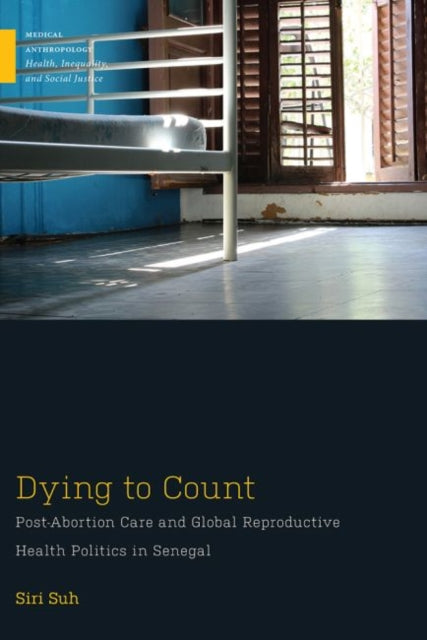Siri Suh
Dying to Count: Post-Abortion Care and Global Reproductive Health Politics in Senegal
Dying to Count: Post-Abortion Care and Global Reproductive Health Politics in Senegal
- Condition: Brand new
- UK Delivery times: Usually arrives within 2 - 3 working days
- UK Shipping: Fee starts at £2.39. Subject to product weight & dimension
Bulk ordering. Want 15 or more copies? Get a personalised quote and bigger discounts. Learn more about bulk orders.
Couldn't load pickup availability
- More about Dying to Count: Post-Abortion Care and Global Reproductive Health Politics in Senegal
In developing countries with restrictive abortion laws and where NGOs relied on US family planning aid, post-abortion care or PAC offered an apolitical approach to addressing the consequences of unsafe abortion. Dying to Count, by Siri Suh, traces how national and global population politics collide in Senegal as health workers, health officials, and NGO workers strive to demonstrate PACs effectiveness in the absence of rigorous statistical evidence.
\n Format: Paperback / softback
\n Length: 226 pages
\n Publication date: 18 June 2021
\n Publisher: Rutgers University Press
\n
In the early 1990s, global health experts introduced a groundbreaking model of emergency obstetric care known as post-abortion care (PAC). This innovative approach was particularly crucial in developing countries with restrictive abortion laws, where non-governmental organizations (NGOs) heavily relied on US family planning aid. PAC offered a non-political solution to address the devastating consequences of unsafe abortion, providing essential care to women who had undergone the procedure.
In her book Dying to Count, Siri Suh delves into the intricate interplay between national and global population politics in Senegal. Through her ethnographic study, Suh explores how health workers, health officials, and NGO workers strive to demonstrate the effectiveness of PAC in the absence of rigorous statistical evidence that the intervention reduces maternal mortality.
Suh argues that pragmatically assembled PAC data convey commitments to maternal mortality reduction goals while simultaneously obscuring the frequency of unsafe abortion and the inadequate care women with complications are likely to receive if they manage to reach a hospital. This is particularly concerning at a time when African women face the highest risk worldwide of death from complications related to pregnancy, birth, or abortion.
Suh's ethnography of PAC in Senegal makes a significant contribution to studies of global health, population and development, African studies, and reproductive justice. It sheds light on the complex dynamics between healthcare policies, cultural norms, and women's rights, highlighting the urgent need for comprehensive and accessible healthcare services for all women, regardless of their socioeconomic status or geographical location.
By examining the experiences of women who have undergone unsafe abortion and received PAC care, Suh sheds light on the critical gaps in healthcare infrastructure and the challenges faced by healthcare providers in delivering quality care to women in need. Her book serves as a powerful reminder of the importance of reproductive justice and the need to address the underlying social and economic factors that contribute to maternal mortality and other reproductive health issues.
In conclusion, Dying to Count by Siri Suh is a groundbreaking work that provides valuable insights into the intersection of global health, population politics, and women's rights. Suh's ethnographic study of PAC in Senegal offers a critical perspective on the challenges faced by women in developing countries and highlights the urgent need for comprehensive and accessible healthcare services. Her book contributes to our understanding of the complex dynamics between healthcare policies, cultural norms, and women's rights and serves as a call to action for policymakers, healthcare providers, and advocates to work towards a world where every woman can access quality healthcare and live free from the fear of unsafe abortion.
\n Weight: 324g\n
Dimension: 229 x 153 x 15 (mm)\n
ISBN-13: 9781978804548\n \n
This item can be found in:
UK and International shipping information
UK and International shipping information
UK Delivery and returns information:
- Delivery within 2 - 3 days when ordering in the UK.
- Shipping fee for UK customers from £2.39. Fully tracked shipping service available.
- Returns policy: Return within 30 days of receipt for full refund.
International deliveries:
Shulph Ink now ships to Australia, Belgium, Canada, France, Germany, Ireland, Italy, India, Luxembourg Saudi Arabia, Singapore, Spain, Netherlands, New Zealand, United Arab Emirates, United States of America.
- Delivery times: within 5 - 10 days for international orders.
- Shipping fee: charges vary for overseas orders. Only tracked services are available for most international orders. Some countries have untracked shipping options.
- Customs charges: If ordering to addresses outside the United Kingdom, you may or may not incur additional customs and duties fees during local delivery.


